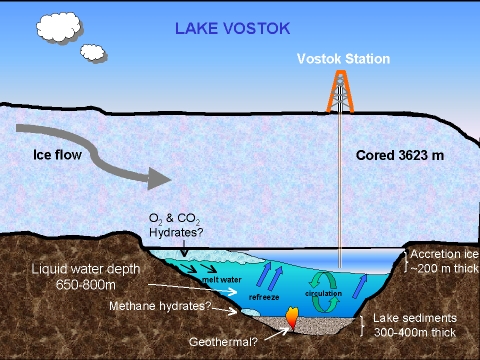Science
Related: About this forumNY Times Feb 8: Russian Scientists Bore Into Ancient Antarctic Lake
MOSCOW — In the coldest spot on the earth’s coldest continent, Russian scientists have reached a freshwater lake the size of Lake Ontario after spending a decade drilling through more than two miles of solid ice, the scientists said on Wednesday.
....
"John Priscu, a geologist specializing in Antarctica at Montana State University, who has kept in contact with scientists in Antarctica and in Russia as the drilling has progressed, said that the anticipation had grown in the past two weeks as the drilling team finally came close to the lake surface just as the Antarctic summer was ending and the weather worsening."
Much more:
http://www.nytimes.com/2012/02/09/world/europe/russian-scientists-bore-into-ancient-antarctic-lake.html?_r=1
It appears that their probe DID reach the lake, and that some small amounts of Freon lubricant may have come in contact with the lake water. Lake samplingsmay have to wait until next December
Little Star
(17,055 posts)It's quite facinating.
southernyankeebelle
(11,304 posts)Motown_Johnny
(22,308 posts)LongTomH
(8,636 posts)Here's a cross-section of the Antarctic ice and the lake:

A map of the Antarctic with the Lake Vostok site marked:

MarkCharles
(2,261 posts)so much more understandable.
I hope you can continue to educate me with stuff like this.
Can you give us all a link to where you found these? Thanks!
LongTomH
(8,636 posts)The first was from the earthsci.org site; the second from dailygalaxy.com. You can right-click on the image and choose: "view image info."
MarkCharles
(2,261 posts)sterile. That is, were all potential contaminants from the drilling NOT exposed to the possibly 30 million year old lake water?
We don't know. Russian scientists aren't always the best at their techniques.
We DO know that the suggested method for boring into the water, that suggested by NASA 3 years or more ago..sterilizing the probe, and letting the probe do the sampling and report back to the surface with the results, that was NOT the technique employed. NASA has not had the funds to develop and produce such a probe over the last few years.
So what we get, next year, if the Russians ever produce and test a sample, is subject to skepticism, at least, but hopefully we will have some microbes to examine that diverted from the world as it was 15-30 million years ago. Then there is the issue of isolation of those microbes from a modern world, and the limitation of contamination of current day microbes, and the remote possibility that such microbial descendants will not easily spread worldwide and wipe out some other forms of live as it exists on this planet now.
Remembering that it only took about 4 or 5 microbes to which the European explorers of the North and South American continent were immune, but those very microbes did their dirty deed on hundreds of thousands if not millions of earlier Native Americans, killing over 90% of them off with diseases to which most Europeans had possessed immunity.
Considering that, 15-30 million years ago, no homo sapiens species existed on the planet. Homo Sapiens came around much more recently, only a million or less years ago, and much less, considering that all non-African Homo Sapiens possess SOME Neanderthal genetic markers, originating from less than 50,000 years ago. Now we have a 15 million year old microbe in that lake, a very strongly vibrant and viable microbe, one that lived for millions of years in frigid non-solar climates, so what is modern man to face here? All conceptual questions, of course, all these microbes could die out in 10 minutes when exposed to other microbial predators, we just don't know.